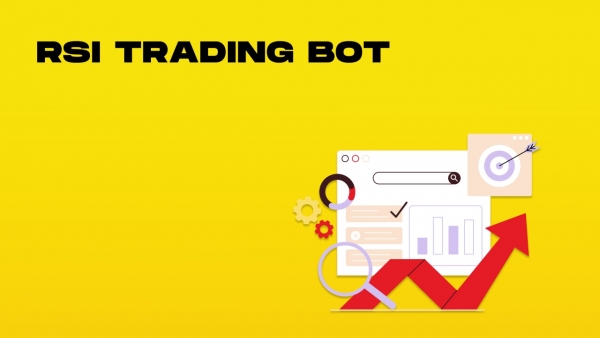What Is an RSI Trading Bot?
An RSI trading bot is an automated program that executes trades based on the Relative Strength Index (RSI) indicator. This bot monitors market conditions 24/7, identifies potential entry and exit points using RSI signals, and executes trades according to pre-set parameters—all without human intervention.
The RSI Indicator Explained
The Relative Strength Index is a momentum oscillator that measures the speed and change of price movements on a scale from 0 to 100:
- Above 70: Typically indicates an overbought condition (potential sell signal)
- Below 30: Typically indicates an oversold condition (potential buy signal)
RSI bots use these thresholds to trigger trading decisions, though many sophisticated bots allow you to customize these levels based on your risk tolerance and trading style.
How RSI Trading Bots Work
RSI bots operate through a systematic process that combines technical analysis with automated execution. Here's how they function:
1. Market Analysis and Signal Generation
The bot continuously calculates the RSI value based on recent price data. When the RSI crosses predefined thresholds, the bot generates buy or sell signals. For example:
- When RSI drops below 30 and then rises above it = Buy signal
- When RSI rises above 70 and then falls below it = Sell signal
2. Rule-Based Decision Making
Unlike human traders who might second-guess their strategy, RSI bots stick to their programming. They follow rules like:
- Trade only during specific market hours
- Limit position sizes to control risk
- Apply confirmation filters to reduce false signals
- Implement stop-loss and take-profit levels
3. Trade Execution
Once conditions are met, the bot places orders through connected exchanges or brokers without delay. This speed advantage is crucial in fast-moving markets where seconds matter.
4. Position Management
After entering a position, the bot continues monitoring the market to manage the trade. It can:
- Trail stop-losses to lock in profits
- Implement a partial profit-taking strategy
- Adjust position size based on performance
Benefits of Using RSI Trading Bots
Trading with RSI bots offers several advantages that can significantly impact your results:
Emotion-Free Trading
Bots don't experience fear, greed, or fatigue. They execute your strategy exactly as programmed, avoiding the psychological pitfalls that plague human traders.
24/7 Market Monitoring
Unlike you, bots don't need sleep. They can analyze markets and execute trades around the clock, capturing opportunities that might occur while you're unavailable.
Backtesting Capabilities
Most RSI bots allow you to test your strategy against historical data before risking real money. This helps you refine your approach based on how it would have performed in past market conditions.
Speed and Efficiency
Bots can analyze multiple markets simultaneously and execute trades in milliseconds—far faster than manual trading allows.
Limitations to Consider
While powerful, RSI trading bots aren't perfect solutions:
Technical Failures
Bots depend on stable internet connections and functioning hardware. Technical issues can lead to missed trades or incomplete executions.
Market Adaptability Challenges
Markets evolve constantly. A strategy that worked well last month might struggle in different conditions. RSI bots need regular optimization to maintain performance.
Over-Optimization Risk
There's a danger in fine-tuning bots too specifically to historical data, creating a system that performs beautifully in backtests but fails in live markets.
Setting Up Your RSI Trading Bot
Ready to implement an RSI bot in your trading? Here's how to get started:
Choose Your Platform
Several options exist for RSI trading bots:
- Commercial solutions: Ready-to-use platforms like WunderTrading, TradingView, or Cryptohopper
- Custom development: Programming your own bot using Python or other languages
- Open-source options: Community-developed frameworks that you can modify
Define Your Strategy Parameters
Customize your RSI bot by setting:
- RSI period (typically 14, but adjustable)
- Overbought/oversold thresholds
- Position sizing rules
- Risk management parameters
- Timeframes to analyze
Test Before Deploying
Always backtest your strategy and then run it in demo mode before committing real funds. This helps identify potential issues in your setup.
RSI Bot Strategies That Work
While basic RSI strategies are straightforward, these advanced approaches can improve performance:
RSI Divergence Strategy
Program your bot to identify divergences between price movement and RSI readings, which often signal potential reversals:
- Bullish divergence: Price makes lower lows while RSI makes higher lows
- Bearish divergence: Price makes higher highs while RSI makes lower highs
RSI + Moving Average Confirmation
Reduce false signals by requiring price to be above or below a key moving average before acting on RSI signals:
- Buy only when RSI shows oversold AND price is above the 200-day moving average
- Sell only when RSI shows overbought AND price is below the 50-day moving average
RSI Range Strategy
In sideways markets, program your bot to buy near support (RSI around 30) and sell near resistance (RSI around 70), capturing profits from predictable oscillations.
Is an RSI Trading Bot Right for You?
RSI bots work best for traders who:
- Have clear trading rules that can be programmed
- Want to remove emotional decision-making from their process
- Need to monitor markets during hours they're unavailable
- Trade frequently enough to justify the setup investment
They're less suitable for investors who prefer fundamental analysis or who lack the technical background to troubleshoot issues.
Final Thoughts
RSI trading bots represent the intersection of technical analysis and automation, offering a disciplined approach to market participation. They can't guarantee profits—no strategy can—but they provide consistency and remove human weaknesses from the equation.
If you're considering implementing an RSI bot, start small, focus on thorough testing, and gradually increase complexity as you build confidence in your system. The most successful traders view bots as tools that enhance their strategy, not magical solutions that replace it.
Remember: The best bot is one aligned with your trading goals, risk tolerance, and technical understanding. Take the time to build a system that fits your specific needs rather than adopting someone else's approach.























